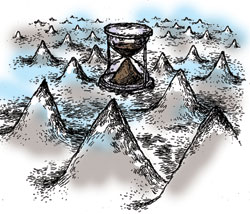 This is just what most of us felt should never have happened. A prolonged, messy conflict with uncertain outcome, more death and misery for long-suffering Nepalis. The birthplace of the Buddha, a land known for tolerance and harmony, is now going to be better known as just another Third World war. Yet another hot spot competing for the brief attention span of the world's media.
This is just what most of us felt should never have happened. A prolonged, messy conflict with uncertain outcome, more death and misery for long-suffering Nepalis. The birthplace of the Buddha, a land known for tolerance and harmony, is now going to be better known as just another Third World war. Yet another hot spot competing for the brief attention span of the world's media. How could things have gone so wrong? It is futile looking too far back to the roots of this conflict. After all, you can go as far back as you want. The 12 years of democratic decay, the Panchayat years that stifled dissent and let social pressures build up, a hundred years of Rana rule, or the socio-cultural substrate of apathy and belief in the pre-ordained.
We know the roots of the problem. It is the prolonged neglect and indifference of the Kathmandu elite and political class to the needs and aspirations of the majority of Nepalis. This did not change with the People's Movement and the mandate our leaders got from a newly sovereign people. Maybe it was too much to expect democracy to start delivering development overnight, and maybe we underestimated the role of the anti-democratic forces to prove the failure of the new order. But it doesn't excuse the way most elected leaders showed disdain for the peoples' welfare, exhibited a singular lack of leadership, squabbled incessantly, squandered away their chance, and in the process gave democracy itself a bad name.
Adding fuel to the fire were the Maoists with their twisted vision of an outdated utopia. They cashed in on the people's silent rage at persistent injustice and inequality, the frustration that political freedom didn't translate into even the hope of economic wellbeing.
After faring badly in the first post-1990 elections the comrades found justification to wage an armed struggle even though the political space existed for them to make their mark. It still exists. On the ground, armed struggle translated into wanton mayhem. (See chronology). This culture of killing off anyone who does not agree with you is so corrosive and irreversible, it will have a profound impact on the Nepali polity for decades to come, and long after the Maoists themselves have moved on.
What is surprising to many is the acceleration of the Maoist revolution, and its rapid spread in the past six years. You could say the straw was tinder dry, but it is also true that the rebels faced no real resistance. Our elected leaders had neither the moral standing nor a proper understanding of what was fuelling the rural revolution. All we had was institutional failure and a governance crisis.
Early attention to genuine grassroots development, and giving the self-governance act real teeth (as Krishna Prasad Sapkota advocates) would have pulled the rug from under the feet of the Maoists. And the 1998 Kilo Sierra Two search and destroy offensive in the mid-west played right into Maoist hands by alienating the civilian population and fuelling the revolution. Just as Mao predicted (excerpts from the Red Book), popular support grew in direct proportion to the government crackdown.
After that, again following Mao's tenets, the rebels picked off police stations one by one, first in their base areas and later all over the country. When the slaughter of policeman started resembling a duck shoot, the government got ready to set up a paramilitary and pass a public security ordinance. This brought down the Koirala government in July, and the Maoists declared a truce and started negotiations.
It may have been na?ve of us to believe that the talks would get anywhere, but we hoped it would work out because the alternative was so horrific. The alternative was what we began to witness this past week.
It is clear now that the Maoists took another of the Great Helmsman's helpful hints to regroup, re-arm and train during periods of rest. And when they did resume fire last Friday, it was with decisive and vicious force, exposing the vulnerability of the government and the total failure of intelligence.
The emergency is not going to resolve the crisis. It depends on how well we demonstrate that we have learnt the lessons about the past lapses that got us to this stage, and begin to correct them. Like improving intelligence and undercover work, not alienating civilians. And, of course, restoring the peoples' confidence that there is a government that cares about its people, and not just about itself.


